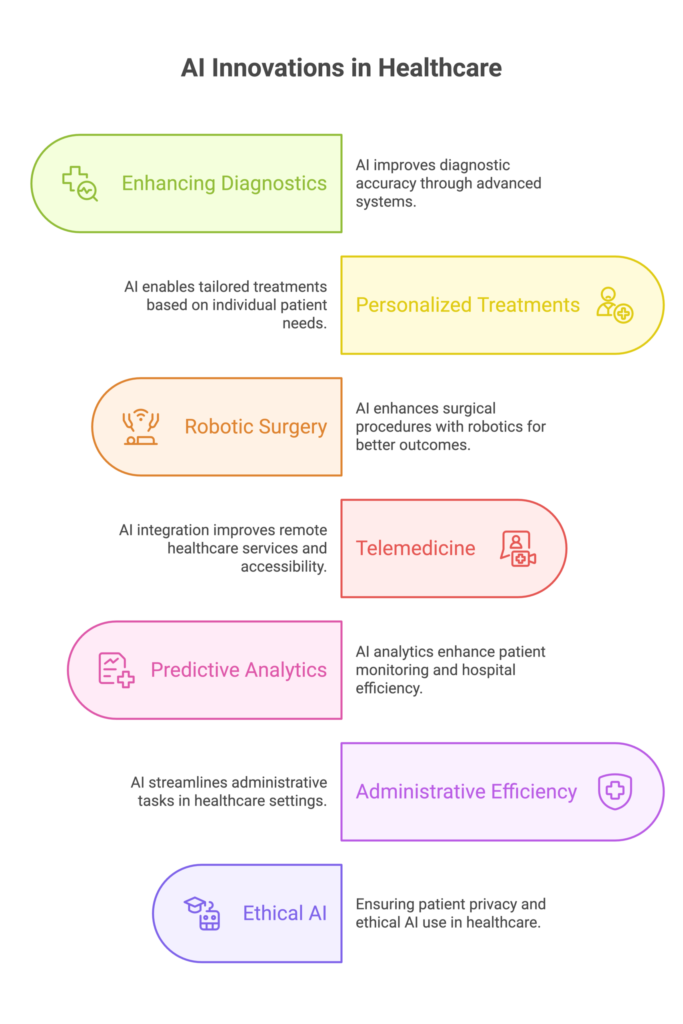7 Incredible ways AI in Healthcare is Transforming in 2025
Healthcare and AI Come Together (AI in Healthcare)
Together. Recently, healthcare has changed because of artificial intelligence. Advanced AI care, diagnostics, and medical operations have had a good influence on healthcare. This blog will provide thorough justifications.

1. Enhancing Diagnostic Artificial Intelligence (AI in Healthcare)
AI is remarkable in exact accuracy, and this will benefit business in the next years. Cutting-edge technology in healthcare research the vast data and assists in patient readmission quickly. AI in radiology not only offers early cancer identification but also helps to enhance therapy. AI in pathology correctly identifies disease, enabling medical care to provide appropriate medication for quicker recovery.
2. Tailored Treatment
Doctors provide the tailored therapy to patients that shortens the course of treatment. The AI evaluates chronic diseases, including cancer, using genetic data. Patient recovery time improves, and patient health outcomes.
3. Robotic Surgery: The Invention
Artificial intelligence in medicine increases the safety as well as the positive outcomes. Devices like Da Vinci do minimally invasive procedures with the help of little incisions. AI also examines the processes to reduce risk and complications.
4. AI Improvements in Telemed(AI in Healthcare)
Chatbots like Ada Health and Babylon Health can help the remote region of India the most. This chatbot recommends the medications on the basis of symptoms. Most patients use the outdoor services of hospitals who suffer from minor medical concerns. These chatbots help lower the daily patient throng and alert to any more severe disease that could be harmful if not treated in time.
5. Artificial intelligence-driven predictive analytics in healthcare
AI can help hospital efficiency, patient monitoring, and healthcare management. AI identifies the patient needing hospitalization and lowers the readmission rate. AI also constantly tracks the chronic diseases, allowing clinicians to control them effectively.
6. Artificial intelligence for administrative efficiency in healthcare
AI reduces the administrative office paperwork in healthcare, hence enabling doctors to spend more time with patients. It facilitates improved tracking of administrative office services offered. Data records of patients can be analysed and aid in tailored services to patients.
7. Ethical AI and privacy in healthcare.
AI guarantees patient privacy to protect health data in accordance with GDPR and HIPAA. AI systems are impartial and devoid of bias, which treat all humans equally, and this produces fair and transparent results.
AI in Healthcare: Future Outlook
Healthcare is at the moment being transformed by artificial intelligence from a notion into reality. AI is improving every phase of the patient experience, from early diagnosis to actual robotic surgery. Algorithms can now predict when patients will deteriorate; they can scan medical images with near-human accuracy, and they help hospitals allocate resources and personnel much better.
This offers an undertow of a greater story—this time between cooperation and takeover. For one, contrary to worries, AI will not replace doctors. On the contrary, it will empower them. Picture AI as the second brain in the room: evaluating several hundred factors in seconds, spotting early signs of disease, or making evidence-based clinical recommendations, while physicians bring complexity, empathy, and ethical judgment that no computer can ever house.
But enormous opportunity also means enormous responsibility. High ethical standards should be the keystones for developing AI for the healthcare sector. Data privacy, algorithmic bias, and explainability are among the serious issues that must be tackled head-on. Acceptance will depend on trust.Leading will be transparent, human-centric artificial intelligence.
Looking forward, artificial intelligence will not only benefit the rich but also the underprivileged by providing distant locations with better treatment, lowering doctor exhaustion, and enabling overworked systems operate more compassionately.
DailyAIWire will keep reporting where innovation meets compassion as the genuine revolution in healthcare is not just intelligent. It is quite humanistic.